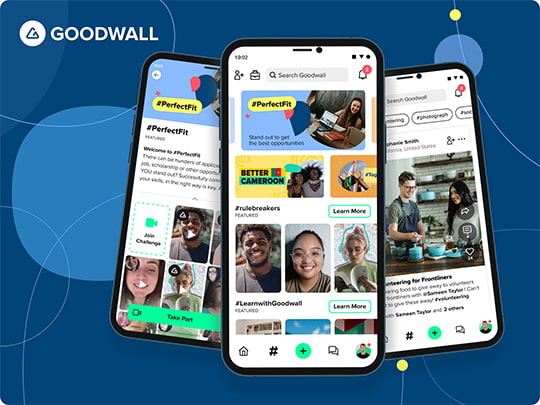If you have been paying attention to the latest Internet news, you know that online privacy and Internet security are becoming a top priority for everyone. Why is that?
There are myriad threats to your safety, like hacking, phishing, spyware and virus attacks, identity thefts, cyberbullying, and work-from-home scams. As the Internet advances, these online risks are going to grow more abundant because cybercriminals will become savvier. This will also become a bigger problem as all of the important aspects of our lives move online.
That’s why finding the best online safety tools to protect yourself from online risks is so crucial. We have compiled a list of the most important online safety tools you need to have in your corner. Help protect yourself and your loved ones from Internet threats.

Want to Improve Yourself Each Day?
Sign up to Goodwall!
- Connect with improvement-focused people from 150+ countries
- Build valuable skills and experience
- Ask questions and get support when you need it
Download the app now to get started for FREE!
Password Manager
Most people aren’t careful enough with the kind of passwords they choose for their most important online accounts. Too many people are still using 123456 as their password or even just ‘password’.
How does a strong password protect your account? When you use a hard-to-guess password with 8 or more characters including symbols, letters, and capitals, that makes it hard for any hacker to guess your password and get into your account.
You wouldn’t want any unscrupulous person to get at your bank accounts as they could get access to your funds and investments. But you also don’t want them to get access to your social media accounts, because they can use your private information for identity theft purposes.
In any case, if you are having a hard time remembering these hard passwords and keeping track of them, then consider getting a password manager. It will store, manage, and protect all your passwords. You don’t want to write down your passwords on a notepad next to your computer or on an insecure document on your laptop that any hacker could access.
A good password manager will prevent others from getting access to your passwords. And it will also alert you when your passwords have been involved in a security breach or are too similar to one another. This is especially crucial nowadays when everyone has not dozens, but hundreds of passwords to keep track of.
VPN
If you tend to browse important websites or accounts on non-private internet lines, you need to install a VPN on your phone and laptop. This could be a cafe or a library that you frequent.
What is a VPN?
A VPN (Virtual Private Networks) is when, through encryption, you can establish a secure private network over the Internet. So if you are browsing at a public Wi-Fi network, you can rest assured that no one can access any of the data that you access.
This is also important when you don’t want certain agencies or unscrupulous persons to know which websites you are browsing. You want to keep your information safe and secure and away from prying eyes. It seems like we live in a world where ‘eyes’ are on us all the time, in the form of security cameras, or other surveillance devices.
A VPN can prevent Internet surveillance because it encrypts all data that passes through that private network.
This can also be helpful if you travel a lot for school or work and wish to protect your data when you are in countries where Internet security isn’t the best.
Related Read: 15 Crucial Online Safety Tips for Students and Young Professionals
DNS
The Domain Name System (DNS) turns domain names into IP addresses, which allow browsers to get to websites and other resources. For example, Google’s primary DNS address is 8.8.8.8. But you would never type that into the browser – you would type in google.com and that would redirect you to the 8.8.8.8 automatically.
The problem here lies when DNS spoofing takes place. In this situation, the DNS is fooled by the hacker into believing that it’s directing the browser to a different IP address, instead of the real one.
For example, you could be typing in internetsafety.com. But the browser sends you to a fake website that’s created by the hacker. You end up putting important login details and other information into the wrong website, giving the unscrupulous person access to your information.
That’s why it’s highly important to choose a private DNS that will have enhanced security as compared to other DNS options. This way you can choose what your privacy settings should be set at.
Automatic Software Updates
You might not think that automatic safety updates would fall into the category of Internet safety tips, but it does. It’s not something that the software developer does only to annoy you (although it might seem like that sometimes).
The developer is coming up with software updates regularly to ensure that they keep up with the various Internet threats on the market. And to ensure that their software is up to par compared to all the new developments in the blogosphere.
Ideally, you would update your software as soon as the software developer releases it. This will ensure that your computer, identity, and devices stay safe as much as possible.
Unfortunately, too many people delay updating their software, until weeks or months later. This puts all their devices at threat of intrusion from dangerous hackers and cybercriminals.
Related Read: How to Take Initiative: Definition & Complete Guide for Career & Education
Antivirus Software
There are many cyber threats on the market like viruses, malware, and more. You can’t possibly keep track of all of them on your own. And thankfully, you don’t have to.
Whenever you purchase a new laptop or desktop, ensure that you install dependable antivirus software on it right away. Use one that’s recommended by a wide variety of online review sites.
Also, make sure to avoid downloading documents from websites that you can’t be sure of. Even if you have antivirus software installed on your computer, you could unintentionally give access to dangerous viruses or malware by downloading infected documents. Always run all downloads through the antivirus software and do not download anything that doesn’t pass muster.
Safe Search Engines
One of the main victims of identity theft and cybercriminals are children. They are more vulnerable to such attacks because they are still so innocent and unaware of all the online risks.
That’s why it’s your role and responsibility to teach your children about online privacy tools so they can grasp the complicated information. Also, use safe search engines and proper settings on your child’s tablet or phone. This way you can ensure they aren’t getting access to inappropriate adult content that’s obscene, vulgar, immoral, or of a sexual nature.
Have a conversation with your children and teenagers to inform them of the dangers of going online, so they are aware. Also, ask them to inform you right away when they come across something online that doesn’t seem right.
You should always be around when they are online so you can prevent them from giving away important information to dangerous criminals online, who are always on the lookout for children they can take advantage of. This doesn’t mean that you become paranoid about them going online, but that you stay alert for all eventualities.
Related Read: How to Stop Procrastinating? 10+ Expert Tips to Kick the Habit for Good
Spam Protection
Another way cybercriminals will get to your information is through phishing. What is phishing? This is when you get a legitimate-looking email in your inbox (or a phone call), but is actually sent out by unscrupulous organizations to get your information.
That’s why banks and other financial institutions are constantly telling you NOT to click links from emails that seem to come from them, but aren’t exactly right somehow, or are asking for account details like passwords and other things. These institutions would NEVER ask for such information through email or the phone. That’s not how they function.
One way you can avoid phishing attacks, at least on email, is by choosing appropriate spam protection. This way all of those unscrupulous emails can be filtered directly into your spam or junk folder, without you ever having to interact with them.
Also, do not give your information to people who call your home phone line or mobile phone. Protect yourself, even if that means you have to act rude and hang up on phone calls from phishers. Be sure to inform your children of the same so they can protect themselves from smart phishing calls or emails.
The Best Online Safety Tools Need to Be Used for Them to Work
If you wish to protect yourself and your family from online security threats, there’s no point installing the best online safety tools but never actually using them. For example, there’s no point purchasing a VPN for your phone, but never switching it on when you browse online because you forget to do so or you find it slows your Internet down.
If you’re interested in more articles like these, check out the rest of Goodwall’s blog.
Also, download the Goodwall app to connect with more than 1.7 million students and young professionals. Get help with your career and college questions. It’s 100% free!



